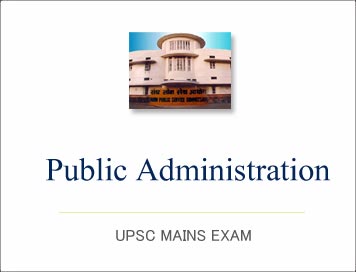(Download) UPSC Mains 2014 Exam Papers: Public Administration Paper- 1
(Download) UPSC Mains 2014 Exam Papers: Public Administration
- Subject: Public Administration Paper -1
- Exam Date: 19th December 2014
- File Size: 1.34 MB
- File Type: PDF
Paper -1
:: Section – A ::
1. Answer the following questions in about 150 words each: 10 × 5 = 50
(a) What are the implications of the post-structuralism perspective on the discrete aspects of Public Administrations, coming from its epistemological positions?
(b) “Adaptive, problem-solving, temporary systems of diverse specialists, linked together by coordinating executives in an organic flux – this is the original form that will gradually replace bureaucracy.” Discuss, in the light of this statement, the ‘end of bureaucracy’ thesis and its strengths and limitations.
(c) “Karl Marx’s interpretation of bureaucracy was rooted in the history of the nature of the State.” Evaluate.
(d) “The conceptual division between administrative and constitutional law is quite porous, and that along many dimensions, administrative law can be considered more constitutional in character than the constitutions.” How would you justify the statement?
(e) Is Peter Drucker justified in saying, “Management principles should not tell us what to do, but only tell us what not to do”? Comment.
Q. 2.
(a) “Governance theory and the notion of governmentality have many points of convergence, but they run on parallel lines.” Comment. 20
(b) “Taylor’s ideas need modification in the context of post-industrial economies in contemporary era.” Justify with reasons. 15
(c) How does the Strategic Contingencies Theory of organizational design deal with problem arising from sub-unit centrality and non-substitutability? 15
Q. 3.
(a) According to McGregor, “True professional help is not in playing God with the client, but in placing professional knowledge and skill at the client’s disposal”. In the light of the above, justify how theory Y is indicative and not prescriptive. 20
(b) “The notion of informal organization is a residual of cafeteria concept of diverse and sprawling contents.” How does Gouldner establish the need for understanding the interdigitations between the ‘formal’ and ‘informal’ organization? 15
(c) “The Right of Informal of not all about citizens’ empowerment, it essentially redefines the concept of accountability.” Discuss. 15
Q. 4.
(a) “New Public Management and post-New Public Management reforms initiatives have affected the balance between managerial, political, administrative, legal, professional and social accountability.” Analyze. 20
(b) “Delegation to independent agencies has taken place in an interdependent process driven by emulation.” Discuss in the context of independent regulatory agencies in the modern regulatory State. 15
(c) “Voluntary organizations have become tools of sensitization of governmental agencies.” Comment. 15
:: Section - B ::
5. Answer the following question in about 150 words each: 10 × 5 = 50
(a) Critically examine the Riggsian concept of differentiation in the context of post-globalization era.
(b) “The term Development Administration can be used only in a broad sense to mark the variety of approaches and points of view.” Discuss.
(c) “The bottom line for governance is outcomes rather than the outputs of government.” Analyze in the context of e-government and e-governance.
(d) “Policies determine politics as governments constrain.” Attempt a critique of this statement.
(e) “Instead of reforms to budgetary process, Wildavsky process to redefine the role of political institutional and rules by which politics leads to agreement on budget.” Explain.
Q.6.
(a) “The fact that we call something performance auditing means that we imply salient features which can distinguish it from other forms of inquiry.” Discuss with reference to the main measures or indicators of performance measurement. 20
(b) “The Output Studies Approach to public policy analysis overstresses the rational techniques and allocative dimension of public policy.” Analyze the statement. 15
(c) “The field of MIS is not necessarily and extension of computer science, but of management of organization theory.” Elucidate. 15
Q.7.
(a) “The technical and multidisciplinary nature of e-government has created an interdependent relationship within government between policymakers, programme administrators and technical specialists.” Analyze in the context of generalist-specialist relationship. 20
(b) “Self-Help Groups have not only empowered women, but have also brought about attitudinal change among all stakeholders towards women development.” Discuss. 15
(c) “Many Asian and African countries have inherited the colonial idea of civil services as a privileged elite. Hence, the social status of the civil services is an important aspect of the bureaucracy’s unsuitability for change.” Comment. 15
Q. 8.
(a) Identify the main elements of Program Budgeting, Output Budgeting and ‘New’ Performance Budgeting. What do they have in common with PPBS? 20
(b) According to Y. Door, “The Science of Muddling through is essentially a reinforcement of pro-inertia and anti-innovation ideas in policy-making”. Comment. 15
(c) “British philosophy of administration is based on a unification of science of administration with ethics.” Analyze. 15


